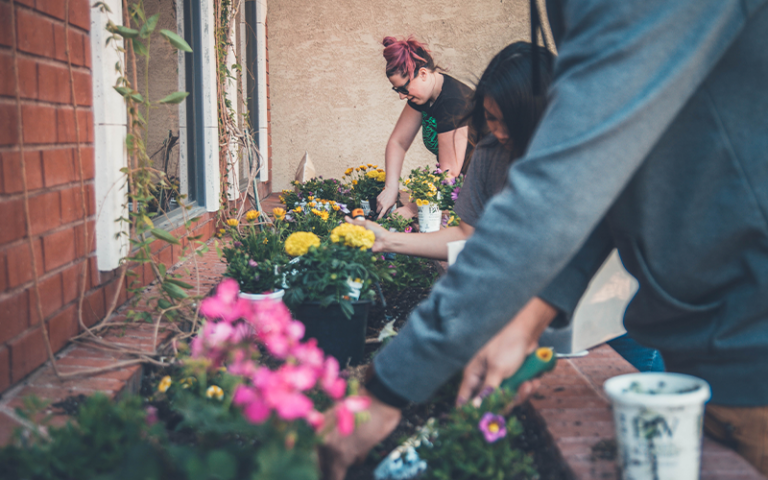Evaluation Exchange: Women + Health
10 February 2022
The Evaluation Exchange is a partnership between UCL and voluntary and community sector organisations in Camden and East London that aims to improve evaluation practice. This blog explores their work with the Camden organisation Women + Health.

Who we are:
Early in the process of working on our evaluation challenge, it was apparent that our three-person team brought a range of background knowledge and experience that would complement our work together.
Meryl and Callie are both second-year PhD students. Meryl is based in both the Psychoanalysis Unit at UCL and the Child Attachment and Psychological Therapies Research Unit at the Anna Freud Centre, whilst Callie is based in the Institute for Global Health. Their research focuses on understanding the mental health of children living in residential care in England and end of life care for children with cancer in Kenya. Rosie is a part-time MSc Public Policy student, alongside working for a charity that supports women who have experience of the criminal justice system and/or survivors of domestic abuse.
Who Women + Health are:
Women + Health provide complementary and alternative medicine therapies and counselling supporting Camden residents and survivors of domestic abuse and sexual violence.
What we have done so far:
Much of our initial work with Women + Health was focused on trying to map an overview of their services and establish how they operate in the local community. As a team, we were able to draw on Meryl's knowledge of working in NHS mental health services to understand how we might use different assessment questionnaires to evaluate outcomes from the services being delivered by Women + Health.
We worked closely with Gemma, the Director of Women + Health, to establish which projects were currently lacking in monitoring and evaluation and explored the value that could be added by introducing tools to improve these. Throughout, we considered the processes already in place at Women + Health with the understanding that it would be most effective and sustainable to build on existing frameworks.
To formalise and progress these ideas, Callie led a Theory of Change workshop. We invited core members of the Women + Health team to join this workshop, to maximise insight and understand the practicalities of introducing evaluative tools within the organisation. This was an enlightening process that helped our Evaluation Exchange team to further understand the overarching goals at Women + Health, and how evaluation tools could be utilised to further achieve these. We ran the Theory of Change workshop using Miro Board, which was a fun way to visualise the journey of Women + Health throughout this process.
Two of the main challenges that we have faced in this process have been due to the ongoing implications of the pandemic. For one, the services being delivered at Women + Health have been modified due to lockdowns and remote working. This has changed the way they are able to collect feedback and measure impact which, in turn, has influenced which evaluative tools may be appropriate to use. Further, not being able to visit the Women + Health space in person has led to a longer process of understanding how their services operate within the community and the role played by the centre itself. This has made it even more important to connect widely with members of staff so that we can fit these puzzle pieces together remotely.
Next steps:
Our next steps are to complete a draft of the Theory of Change to ensure that this accurately reflects the goals and changes that Women + Health would hope to see. As the project moves into the next stage, we hope to create an evaluation tool for one service to support the understanding and impact of service delivery. Given the time limitations of this project, we hope that by creating this Theory of Change, Women + Health will be able to use this in the future to embed further evaluation tools into their working practices.
 Close
Close

